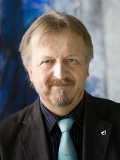| [ Print ] |
|
Dr.-Ing. Werner Henkel |
 |
|||||||
Curriculum Vitae
Werner Henkel was born in Gelnhausen, Germany, in 1960. He received his Diploma and Dr.-Ing. (Ph.D.)
degree from Darmstadt University of Technology (TUD) in May 1984 and June 1989, respectively. The PhD
was on analog coding, currently also named deterministic compressive sensing. From 1989 to 1999 he was
with Deutsche Telekom's RD Labs in Darmstadt, mainly involved in the design of coded modulation schemes
for satellite communication and later heading projects for high-rate subscriber-line transmission. Besides the
scientific work, he was active in standardization of DSL in Europe (ETSI) and supported the German first DSL
roll-out, determining Deutsche Telekom's requirements and checking compliance of the first DSL modems to
be installed. Major contribution to Multicarrier in DSL were made. One of the patents got implemented in a
big fraction of ADSL modems.
In 1993/94, he was on sabbatical leave at AT&T Bell Laboratories (later Lucent), Advanced Data Communications Group, active in DSL and headed by J.J. Werner. From 1999 to 2002, he was with the newly founded
Telecommunications Research Center Vienna, serving as area representative and heading a basic research
group dealing with access technologies with a focus on signal processing and coding for DSL. He was teaching
courses on coding theory at the Universities of Kaiserslautern, Germany, and Vienna, Austria and industry
courses on DSL.
In August 2002, Dr. Henkel became a professor for telecommunications at the University of Applied Sciences
in Bremen. Since September 2003 he is a professor for electrical engineering at the Jacobs University Bremen
(formerly International University of Bremen), chairing the ECE
program from its existence until 2022. He was elected Dean for Engineering and Mathematical
Sciences in April 2012, a duty that was ending in June 2014. From January to April 2015, he was visiting Old
Dominion University (ODU), Norfolk, VA as adjunct faculty.
Courses taught are: Coding Theory; Information Theory; Data Compression, Compressive Sensing, and
Modern Coding; Digital Signal Processing; Signals & Systems, Lecture and Lab; Wireline Communications
(DSL); Measurement automation; Circuits; Statistical Analysis and Simulation, and also introductory EE and
math courses.
Dr. Henkel was in the organizing committee of ISIT 1997 (publications) and has organized several workshops
and courses. He has served as a guest editor for the June 2002 issue of IEEE J-SAC on DSL. He was in the
technical program committees of the International Zürich Seminar 2004, of EUSIPCO 2004 and 2007, ICC
2006, 2017-2026, CNS 2025, of the Turbo Symposia (ISTC) 2008, 2010, 2016, 2020/21, 2023, of the IWCMC
2022 Security Symposium, the GC 2022 Workshop `5GBeyond' and of INFOCOM Wireless-Sec 2023, in the local
organizing committee of SampTA 2013, the general chair of the Turbo Symposium 2014, and TPC chair of
the Turbo Symposium 2018. He is reviewer of the DFG (Deutsche Forschungsgemeinschaft), IST (European
Commission), and the IWT, Belgium. Publications are in the areas of coding, iterative decoding, unequal error
protection, coded modulation, joint source-channel coding, network coding, frame synchronization, channel
modeling, impulse noise, DSL, single- and multicarrier transmission, multi-user, MIMO, DNA analysis, and
physical-layer security. Current research activities have a focus on impulse noise treatment (cancellation,
coding) for wireless and wireline channels, LDPC codes, neural networks, DNA analysis, joint source-channel
coding, LDPC-integrated equalization, and physical-layer security for wireless and wireline channels. Recent
industrial projects were related to satellite communication, security, and powerline communication.
|
||||||||